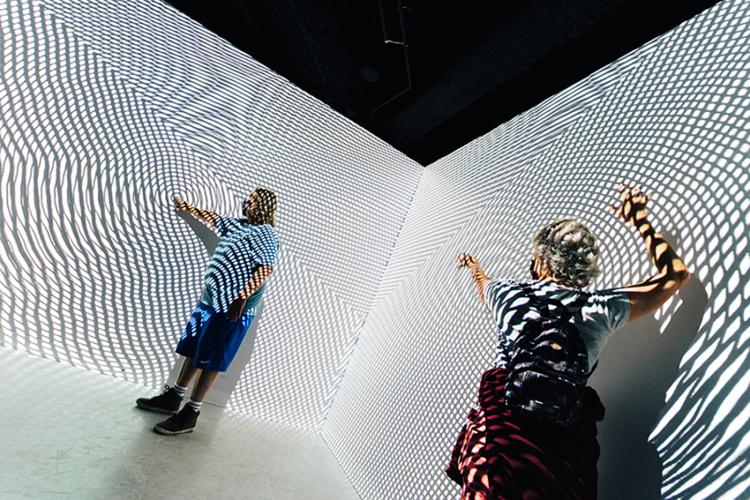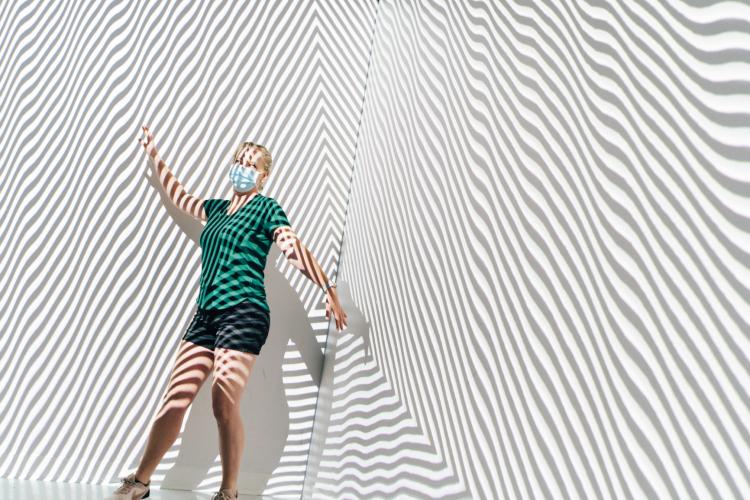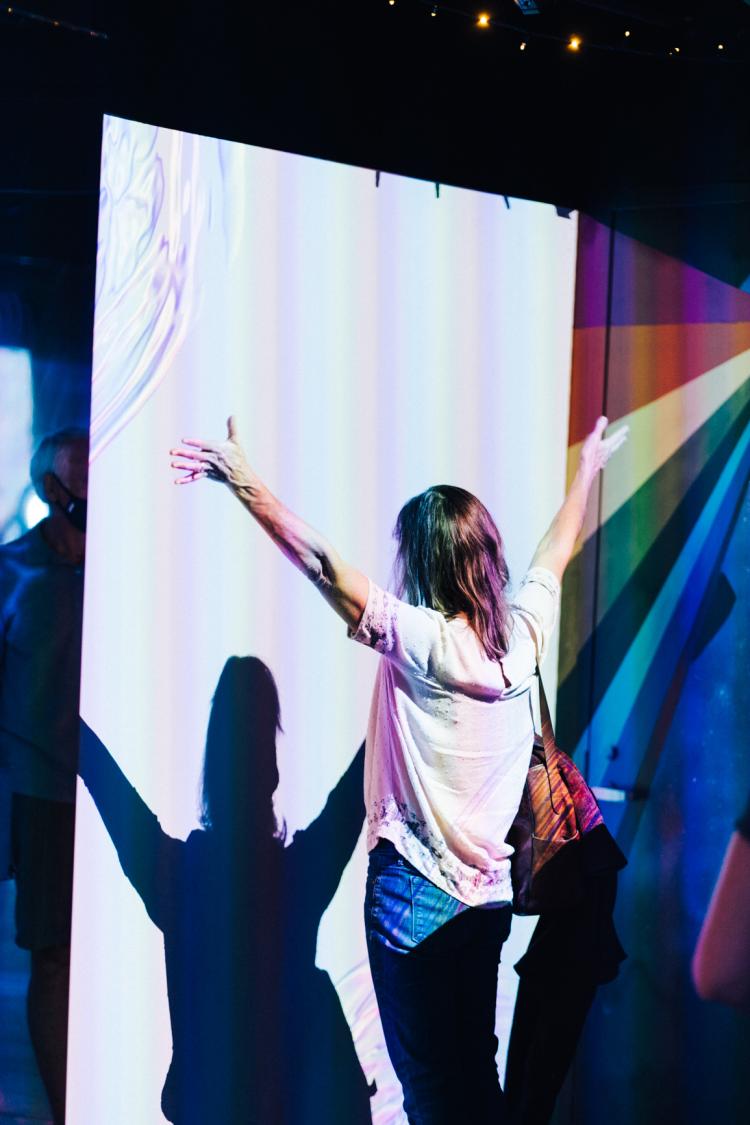Meow Wolf Denver features work by CU Boulder community

Justin Gitlin, a renowned multimedia artist and a lecturer for the Creative Technology and Design program, designed and built Moiré Room, a mesmerizing, algorithmically-generated audiovisual experience made up of ever-changing black-and-white projections accompanied by constantly varying computer music. The sound and visuals are both infinitely variable and interactive, subtly responding to visitors around the exhibit.
Ria Khan, a 2020 graduate of the Creative Technology and Design master’s program, designed and built Galactic Autoquarium, involving a team of nine ATLAS students and alumni in the creation of a visually eye-popping space that features robotic fish, riddles and digitally generated interactions.
Corrina Espinosa, CU Boulder alumna (MFA’17 Integrated Art), who was an artist-in-residence in the ATLAS BTU Lab in 2016 and teaches Digital Art 1 and 2 for the Department of Art and Art History, built a three-panel installation made up of life-sized, dancing puppets. She says the ATLAS Institute and the BTU Lab are “paramount in her growth as a tech-based artist." Her first introduction to ATLAS was a course in wearable electronics when she was an MFA student. This connection led to her yearlong BTU artist residency, which was primarily focused on her MFA thesis work. She subsequently returned to teach the wearable electronics course that gave her the entré to the community in the first place.
Officially named Meow Wolf Denver Convergence Station, it is the latest permanent art exhibition for the organization, which began in Santa Fe, New Mexico, and opened its second location in Las Vegas in February 2021. More than 200 artists working in a wide variety of mediums have contributed to creating bold and immersive experiences found throughout the exhibition space.

Justin Gitlin’s involvement with Meow Wolf goes back four years to a meeting with the organization's Santa Fe’s technical director. Gitlin, who had by then worked on high-profile installations for Nike, Madame Tussauds wax museum and others, pitched his idea for the Moiré Room, which was quickly accepted.
He explains that the concepts behind Moiré Room are rooted in his fascination with the mesmerizing effects black-and-white patterns can have on perception. He wanted to generate these kinds of patterns dynamically using algorithms that would incorporate variability based on data streams from the immediate vicinity of the installation.
Since these data streams would never be the same, the patterns generated would always be unique. In addition, he wanted to intensify the visual experience with an audio accompaniment that was integrated into the graphics; with the audio environment taking cues from an ever-changing visual field, and the graphics influenced by a constantly changing auditory and spatial environment, the feedback loops create practically infinite variability. As a result, each visitor experiences—and helps create—something entirely unique in Moiré Room. Gitlin likes the idea that each visitor plays a role in making their visit to Moiré Room unlike anyone else's—how it creates a more intimate connection between visitors and the artwork, he says.
Developing the concept was one thing, implementation another. Small prototypes for the project's components were built over several years: refining the visual pattern generation and audio analysis came first, body-tracking with computer vision and projection mapping followed. “Whenever I get a chance to integrate my music into my code that's always really exciting for me,” says Gitlin.
The experience can be calming one moment and anxious the next, as sounds and shapes evolve together over time, Gitlin says.
Gitlin has seen scores of Instagram selfies posted by fans who have visited his installation.
“It’s been fun to watch the public interacting with the piece,” says Gitlin. “Each person has their own moment in time, where the backdrop is whatever they’re taking a photo of.”

Galactic Autoquarium, designed and fabricated by Ria Khan (MS-CTD’20, they/them/theirs) and a team of students and alumni from CU Boulder’s ATLAS Institute, immerses visitors in an “intergalactic and ancient community of robotic fish,” Khan explains.
As an undergraduate fine arts major, Khan spent a lot of time in the institute’s BTU (Blow Things Up) Lab, where they began experimenting with and creating robotic fish. As interest grew, Khan presented workshops to students eager to replicate the fish.
"People enjoyed the weird whimsey of dinky fish swimming in mineral oil and wanted to learn how to do it,” Khan said. “When the (Meow Wolf) call for entries came out, I thought it would be really cool to have a whole installation about them.” Khan pitched to Meow Wolf the Autoquarium idea as a first-year ATLAS graduate student enrolled in the College of Engineering’s Creative Technology and Design (CTD) program.
As visitors enter the whimsical creation, their reflections multiply in a mirrored room of celestial and oceanic themes. Wall-mounted, brightly-colored domes scattered along the walls hold swimming robotic fish. Above, “celestial” aquatic coral, a “galactic infinity mirror” fish pond, and starry lights float; below, light patterns reminiscent of water reflections twinkle. And to the sides, two painted murals of fish project a rainbow onto an adjacent wall covered with animated projection visuals.
Throughout the exhibit, old-fashioned talk boxes (typically utilized in the real world to notify apartment residents they have visitors) contain the room’s secrets. Some fish “deities” speak in riddles, interacting through talk boxes to share “hidden wisdoms,” ultimately guiding visitors to the other artists’ exhibits.
“Seeing people enjoying it was magical,” says Khan, noting that visitors became very engaged with the riddles during the installation’s preview days.
Khan says they are proud of their team’s work, which included complicated object-oriented computing, and Raspberry Pis and Teensy (USB-based microcontroller development system) hardware.
Khan also adds that they’re proud of the diversity of the arts and technology team who built it. “We have women, trans and non-binary folk, and people of color, showing the diversity in our skill sets and in ourselves. Speaking as a femme non-binary person of color, I especially appreciate that.”
- Title: Moiré Room
Collaborator: Justin Gitlin, aka Cacheflowe, lecturer for the MS-CTD program
- Title: Galactic Autoquarium
Collaborator: F. Ria Khan (MS, TMS—Creative Technologies + Design '20), BTU, THING and Living Matter labs alum
Assisted by: Armon Naieini* (BS, TAM’19)—projection visuals; Sofia Rubio-Topete (TAM minor '20); Harrison Bolin (BS, CTD’21); Calvin Logan* (CTD/Art undergraduate student)–narrative designer and primary ceiling decor fabricator; Luke Collier (BS, mechanical engineering '20, BTU Lab alumnus) and Charles Candon* (mechanical engineering undergraduate; BTU Lab member)—physical fabrication; Sky Johnson* (BS TAM ‘20)—lead programmer; Blake Gambel* (BS, TAM’19)—lead programmer/general fabrication; Maria Deslis (MS-CTD’20) senior programmer.
(*key contributors)
- Title: Time Machine Malfunction Dance Party
Collaborator: Corrina Espinosa, MFA integrated art '17; BTU Lab artist-in-residence '16


